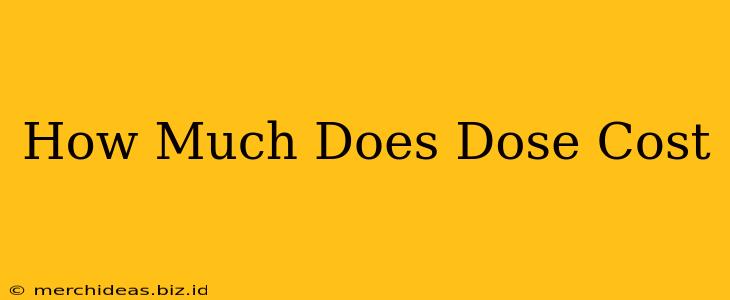How Much Does a Dose Cost? A Comprehensive Guide to Medication Pricing
Understanding the cost of medication can be confusing. The price of a "dose" varies wildly depending on several factors. This guide will break down the key elements influencing medication costs and help you navigate the complexities of prescription and over-the-counter (OTC) drug pricing.
Factors Affecting Medication Costs
Several interconnected factors determine the final price you pay for a dose of medication:
-
The Drug Itself: Brand-name medications are typically significantly more expensive than generic equivalents. This is because brand-name manufacturers recoup research and development costs, marketing expenses, and profit margins in their pricing. Generics, containing the same active ingredients, are much cheaper because they don't bear these same development costs.
-
Dosage Strength: A higher dosage strength (e.g., 20mg vs. 10mg) may not always double the price, but it will usually increase the cost per dose. The cost increase isn't always proportional.
-
Form of Medication: The formulation (tablet, capsule, liquid, injection) significantly impacts cost. Specialized formulations, like extended-release tablets or inhalers, tend to be pricier than standard tablets.
-
Quantity Purchased: Buying medications in larger quantities often lowers the per-unit cost. This is particularly true for regularly used medications.
-
Insurance Coverage: Your health insurance plan plays a crucial role. The copay you pay depends on your plan's formulary (the list of covered drugs), tier level (different cost-sharing levels), and whether the medication is covered at all. Some plans may require pre-authorization for certain medications.
-
Pharmacy: Different pharmacies charge different prices, even for the same medication. Comparing prices across multiple pharmacies, both online and in-person, can lead to significant savings.
-
Location: The geographic location also affects the price. Drug costs can vary significantly from state to state and even between cities within the same state.
Finding Affordable Medications
Several strategies can help you manage medication costs:
-
Ask your Doctor about Generic Alternatives: Generic medications are chemically equivalent to brand-name drugs and often represent substantial savings.
-
Utilize Prescription Discount Cards: Many organizations and pharmacies offer prescription discount cards that can lower out-of-pocket costs. These cards are usually free to obtain and can provide discounts even if you have insurance.
-
Compare Prices at Different Pharmacies: Check prices at various local pharmacies and online pharmacies to find the best deal.
-
Explore Patient Assistance Programs: Pharmaceutical companies sometimes offer patient assistance programs (PAPs) to help individuals afford their medications. These programs typically provide free or reduced-cost medications to eligible patients.
-
Negotiate with Your Pharmacy: Sometimes, pharmacies are willing to negotiate prices, especially for long-term prescriptions.
-
Consider Mail-Order Pharmacies: Mail-order pharmacies often offer lower prices for larger quantities of medication.
Conclusion
Determining the exact cost of a "dose" requires considering numerous variables. By understanding these factors and utilizing the strategies mentioned above, you can effectively manage medication expenses and ensure you have access to the necessary treatments. Remember to always consult your doctor or pharmacist before making any changes to your medication regimen.
